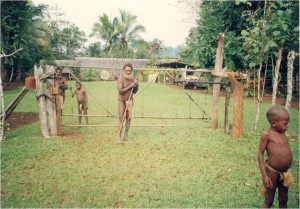About
BONJOUR! HELLO! WELKAM!
no images were found
Welcome to “South Pacific Puzzle: Coping with Independence.” My name is William Miles and I’m a political scientist at Northeastern University in Boston. In 1991, I spent seven months in the small island-nation of Vanuatu in the South Pacific conducting research into language and politics. Why Vanuatu? ….. For several years now, I have been interested in Third World Countries that had once been colonies of France and in which people still speak French. How they differ from former British colonies of similar history and ethnicity has also intrigued me. Then — voilà — I discovered that there was one country that had simultaneously been a French and a British colony. They called it a condominium–on account of it being jointly ruled–and until independence in 1980 it went by the name of New Hebrides.
This was just too fascinating to read about from afar. So I applied for a Fulbright Fellowship and when I got it, my wife packed up our three-year-old daughter and one-year-old son, and off we went!
Professor Miles on Condominium
During those first seven months I traveled extensively, learned the local language, visited schools on different islands, and conducted numerous interviews. These included current and former prime ministers and even a former rebel leader. I also took hundreds of pictures and tape-recorded many hours of music, instruction, and speech. The following summer my university sent me back to Vanuatu to continue my work. This time though, I was armed with a video camera. With the help of Digital Media Services and the EdTech Center at Northeastern, I have compiled text, sound, pictures and video to give you the opportunity to interactively explore Vanuatu on your own.
In the years since my fieldwork there have been some notable changes in Vanuatu. Some of the prominent persons who appear on this site – including the nation’s founding father and first prime minister, along with the rebel leader who opposed him – have since passed away. Others have taken on and left the helm of state in their turn. But the background, context, and issues that frame Vanuatu’s current reality remain pertinent. And the ability to access here the faces and voices of past leaders, political actors, and historical witnesses should be of value to casual visitors and specialists alike.
An underdeveloped nation with a split colonial past and lingering linguistic rivalries, compounded by internal geographic and social divisions, makes for a difficult independence. I have written up and published these findings in a book and a number of academic journals. But these do not come close to conveying the “sight and feel” of life in this extraordinary and captivating nation. So I hope you will learn, and enjoy, as you fit together the different pieces of this South Pacific puzzle.

